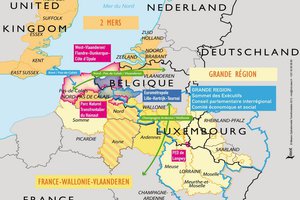News
MOT study on French-Belgian cross-border cooperation
December 2014
As 2014 draws to a close, the technical work to update the report of the French-Belgian parliamentary working group (GTPFB), initiated by the prefecture of the Nord-Pas de Calais Region, is being finalised. This initiative has benefited from the support and expertise of the MOT.
The updating process of the GTPFB's work* aims to re-examine the obstacles to cooperation and to propose new action plans to overcome them.
This process has mobilised the political and technical representatives of the French authorities of the Nord-Pas de Calais Region and all levels of government in Belgium in order to work collectively to remove these obstacles.
Thus, with support from the MOT, a written consultation, targeted interviews and four working groups with the competent institutions have been organised. Grouped around four thematic areas (territorial development, transport and the environment; healthcare; the economy, jobs, education and professional training; and civil security), the working groups met for an initial session in July and a second one in October-November. The discussions helped to make progress with understanding what the obstacles are, defining common objectives and proposing the solutions to be implemented.
This initiative, which is unique along France's borders, has also been followed at national level, by the French embassy in Brussels and France's General Commission for Territorial Equality, and by Belgium's General Consul in Lille.
The approach of identifying obstacles and solutions seen in this French-Belgian initiative is a positive example to be transposed to other borders in order to improve cooperation and provide better services to citizens living in cross-border regions.
* In 2005, a French-Belgian parliamentary working group (Groupe de travail parlementaire franco-belge – GTPFB) was set up in order to identify obstacles to cross-border cooperation along the French-Belgian border and to come up with concrete solutions. More info
Back to list

